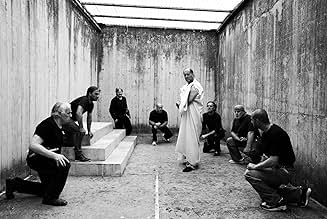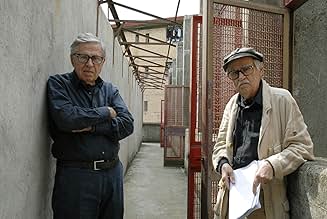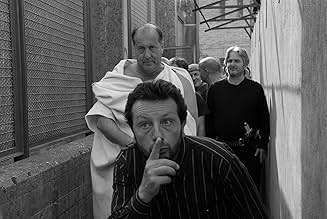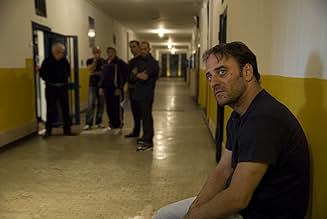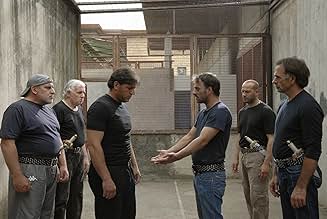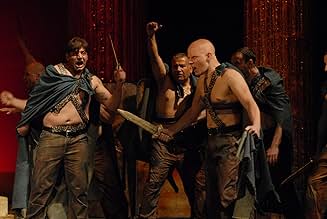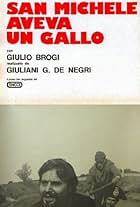IMDb RATING
7.3/10
6.9K
YOUR RATING
Inmates at a high-security prison in Rome prepare for a public performance of Shakespeare's "Julius Caesar."Inmates at a high-security prison in Rome prepare for a public performance of Shakespeare's "Julius Caesar."Inmates at a high-security prison in Rome prepare for a public performance of Shakespeare's "Julius Caesar."
- Directors
- Writers
- Stars
- Awards
- 16 wins & 21 nominations total
- Directors
- Writers
- All cast & crew
- Production, box office & more at IMDbPro
Featured reviews
Six years on from The Lark Farm, Paolo and Vittorio Taviani found in stage productions of the Roman prison inmates Rebibbia energy and the urge to get back behind the camera and make a new film. They wrote and directed and produced within the Roman prison facility and with the same group of actors-prisoners.
Only apparently docudrama, but in reality almost entirely representation, Caesar must die tells the staging of "Julius Caesar" by Shakespeare, who are leaving very little overlap between the preparation of the play and the play itself, the express wish to amplify the most painful and intimate adhesion of the detainees to their characters and feelings they carry. The films of the Taviani can undoubtedly convey the strength and passion of surprising interpretations, and is able to find moments of clear staging with a charm that builds on the context, but transcends it. Unfortunately, however, is also weighed down by an idea of cinema out of date and time.
The intensity of black and white "Giulio Cesare" acted within the walls of prison, goes limp, in fact, when the Taviani brothers - who, caught between themselves and Bertold Brecht were unwilling or able to give up the script, or embrace moments of pure documentation - they feel heavy and intrusive outside their hand. When they try to break the scene with a background, however artificial and, therefore, artificial. The illusion of reality sought by directors does not take off then ever, and breaks the suspension of disbelief achieved in staging Shakespeare. Worse still surrounds the operation with a sort of condescending paternalism that file the roughness, the personalities, the possibilities.
Why show "faking" two prisoners who bicker "really", another unable to take part in the tests because they tried to interview, one imagines the arrival of women in the theater or another that says, reciting, that "by when he met the art cell has become a real prison, "is frankly disturbing and morally objectionable, because it becomes another cage that imprisons artistic protagonists.
Only apparently docudrama, but in reality almost entirely representation, Caesar must die tells the staging of "Julius Caesar" by Shakespeare, who are leaving very little overlap between the preparation of the play and the play itself, the express wish to amplify the most painful and intimate adhesion of the detainees to their characters and feelings they carry. The films of the Taviani can undoubtedly convey the strength and passion of surprising interpretations, and is able to find moments of clear staging with a charm that builds on the context, but transcends it. Unfortunately, however, is also weighed down by an idea of cinema out of date and time.
The intensity of black and white "Giulio Cesare" acted within the walls of prison, goes limp, in fact, when the Taviani brothers - who, caught between themselves and Bertold Brecht were unwilling or able to give up the script, or embrace moments of pure documentation - they feel heavy and intrusive outside their hand. When they try to break the scene with a background, however artificial and, therefore, artificial. The illusion of reality sought by directors does not take off then ever, and breaks the suspension of disbelief achieved in staging Shakespeare. Worse still surrounds the operation with a sort of condescending paternalism that file the roughness, the personalities, the possibilities.
Why show "faking" two prisoners who bicker "really", another unable to take part in the tests because they tried to interview, one imagines the arrival of women in the theater or another that says, reciting, that "by when he met the art cell has become a real prison, "is frankly disturbing and morally objectionable, because it becomes another cage that imprisons artistic protagonists.
I saw the world premiere of this movie at the Berlinale, where it won the golden bear last night. The movie is not bad, but also not special. The basic idea -real prison inmates play Shakespeares "Julius Caerar"- makes the movie interesting and the impressive acting makes you often forget, what fate those men face and what brought them to prison (murder, mafia-crimes etc). But since you know all that from the promotion already, the movie sometimes just leads up to watching an old Shakespeare-play, which we also already know. Just some philosophic aspects (at the end) and the idea of not showing the actual play, but the criminals only practicing it most of the time, is very entertaining.
The concept is very original, giving criminal prisoners the opportunity to produce a Shakespearer play in prison, the plsy being "Julius Caesar", and each prisoner allowed to speak in his own dialect. The result is a very stylistic and primitive alternative Shakespeare, mainly shown by rehearsals, and especially Brutus makes a very good performance. The text is considerably mutilated, only the action scenes are mainly presented, and there is not one woman in the whole performance. Still, it's an interesting representation, like all the films of the brothers Taviani are, and the main credit is the original angle. Most of the film is in black and white, to which the colour sections present a great efficient contrast. The theatre performance turns into a tremendous success, in spite of some arguments among the prisoners.
The Shakespearean 'All the world's a stage' gets a new meaning with this very interesting and very different film made by the Taviani brother whose actors and heroes are individuals for which the world is the high security prison where many of them are to spend long years paying for serious crimes. Using theater as a mean of therapy end education happens in some of these prisons, now a film not only dares to make this process known and visible outside the perimeter of the prison, but also tries to make of it a work of art. The Golden Bear at the Film Festival in Berlin is a proof that the Taviani brothers succeeded to convince at least the critics and members of the jury. I get the feeling that the larger public was less convinced - it's a very interesting piece of cinema, but not one of these that attracts audiences in numbers. This is not entertainment.
In one of the introductory scenes we see a screen test. The actors-to-be are asked to introduce themselves in two situations - a 'soft' family one, and a second which demands them to feel constrained and express rage. Each of them acts with a mix of sincerity and intensity that much exceeds and compensates their lack of professionalism. This is the key of the film. We have already seen theater in theater (Shakespeare himself is the first and maybe greatest master of the genre) and theater about prisons, and many of these were already brought to screen. What we have never seen before is the mix of situations which makes the walls of the prison disappear for the ephemeral moments when the words of the ancient drama become the reality of life for the prisoners acting it.
The film asks many questions which arise after the screening ends. Julius Caesar is a play about values - honor, democracy, freedom. How do the prisoners relate to these? The characters of the play are cruel in modern terms, the plot is also about treason and murder - how do these men who have committed serious crimes relate to these deeds? Some of the most interesting moments in the play (and there are only a few of them) are these in which real life (which for the actors is life in prison) interferes in the scenes of the play. I found the smooth, sometimes unobserved, sliding of life in a 21st century prison into the political drama that took place in the first century BC to be terrifying.
And then we have the ending. The show is over, it ends in applause and ovations. Then the actors get back to what is their 'home' - the prison where most of them still have to spend many years. What we do understand is that life cannot go on without such a film changing it. The lives of the special actors in this movie, but to some extent the lives of the spectators as well.
In one of the introductory scenes we see a screen test. The actors-to-be are asked to introduce themselves in two situations - a 'soft' family one, and a second which demands them to feel constrained and express rage. Each of them acts with a mix of sincerity and intensity that much exceeds and compensates their lack of professionalism. This is the key of the film. We have already seen theater in theater (Shakespeare himself is the first and maybe greatest master of the genre) and theater about prisons, and many of these were already brought to screen. What we have never seen before is the mix of situations which makes the walls of the prison disappear for the ephemeral moments when the words of the ancient drama become the reality of life for the prisoners acting it.
The film asks many questions which arise after the screening ends. Julius Caesar is a play about values - honor, democracy, freedom. How do the prisoners relate to these? The characters of the play are cruel in modern terms, the plot is also about treason and murder - how do these men who have committed serious crimes relate to these deeds? Some of the most interesting moments in the play (and there are only a few of them) are these in which real life (which for the actors is life in prison) interferes in the scenes of the play. I found the smooth, sometimes unobserved, sliding of life in a 21st century prison into the political drama that took place in the first century BC to be terrifying.
And then we have the ending. The show is over, it ends in applause and ovations. Then the actors get back to what is their 'home' - the prison where most of them still have to spend many years. What we do understand is that life cannot go on without such a film changing it. The lives of the special actors in this movie, but to some extent the lives of the spectators as well.
Perhaps its the beautiful rolling sound of the Italian dialogue telling the story of Julius Cesar that made this enjoyable at least to the auditory sense. Perhaps it was that the language was sometimes amended to be more modern and meaningful. Perhaps it was the explained parallels of some of the prisoners experiences that helped to make the context more understandable. No matter, it was a thoroughly great way to start the Sydney Film Festival. The fact that this was a script within a script set in a prison using some real life prisoners didn't detract from anything in this film for me - I go to the cinema generally looking for a story, a fabrication, an unreality dressed in reality. I liked the gritty black and white, the sub-line of the prison life and setting. Yes, perhaps a prisoner saying he now felt caged etc didn't have to be said because it was obvious, but all in all a very enjoyable watch. I was engaged and participating from beginning to end. For me, one of the better versions of Julius/Shakespeare and a nice twist on an old but everlasting story.
Storyline
Did you know
- TriviaPaolo and Vittorio Taviani heard about the prisoners acting program and contacted Fabio Cavalli with the idea of doing Shakespeare's play and shot the whole experience.
- ConnectionsFeatured in Film '72: Episode dated 27 February 2013 (2013)
- How long is Caesar Must Die?Powered by Alexa
Details
Box office
- Gross US & Canada
- $76,908
- Gross worldwide
- $1,567,339
- Runtime1 hour 17 minutes
- Color
- Sound mix
- Aspect ratio
- 1.85 : 1
Contribute to this page
Suggest an edit or add missing content



